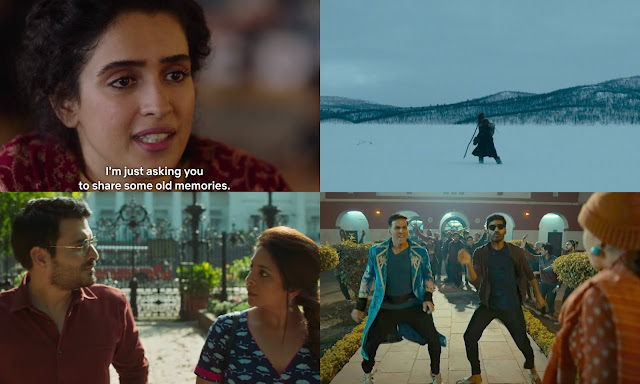
It is the end of January of 2022. Perhaps, it is too late to talk about the films of 2021. But, like every year, I am putting down some scenes that come to my mind when I think about the films of the last year. There were not many good films to watch anyway but still compiling a few notes on some of them.
Pagglait:
Umesh Bist's Pagglait, where a widow Sandhya (Sanya Malhotra) finds life after the death of her husband, was a wonderful film. I love the parts of the film where Sandhya's soul liberates her and prepares for a journey to meet her desires. Like in the thirteen days after death, the soul releases from the body and prepares for a journey to Yam Lok. An earthen pot is kept outside the house with food to feed the soul during this time. Sandhya is forced to eat the bland flood during this time. On the fourth day of mourning, her husband Astik's ashes are dispersed in the river. Side by side, there is Sandhya eating gol gappas underscoring that she is taking steps to fulfill her long-suppressed desires. On the tenth day of mourning, the soul becomes whole again. Pind daan is performed for Astik. The earthen pot is broken, and the soul is released. During this time, Sandhya learns more about Astik and Akansha (Sayani Gupta). She goes through a plethora of emotions. Like the soul is without a body in this period, Sandhya is seen in shadows and reflections. On the tenth day, Sandhya forgives Astik and, finally, cries. On the thirteenth day, all rituals are completed for Astik. The soul moves away from the family. Sandhya runs away from her family, forging a new path for herself. I also love the dialogue when Sandhya meets Akansha at a café and pleads with her to tell her about her time with Astik. "Bas kuch purani yaadein maang rahi hun," she tells her. And, yes, Phire Faqeera is superb.
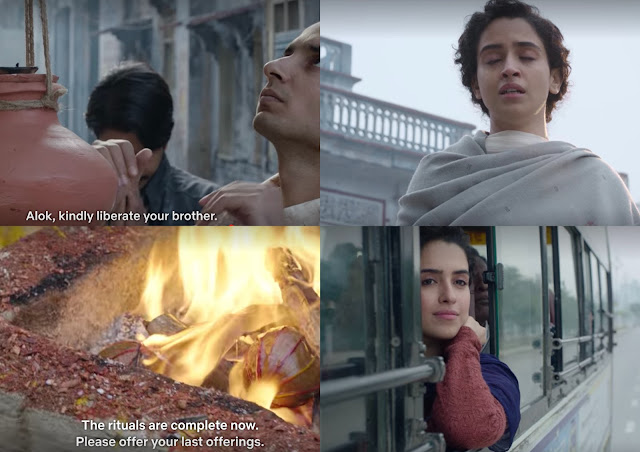
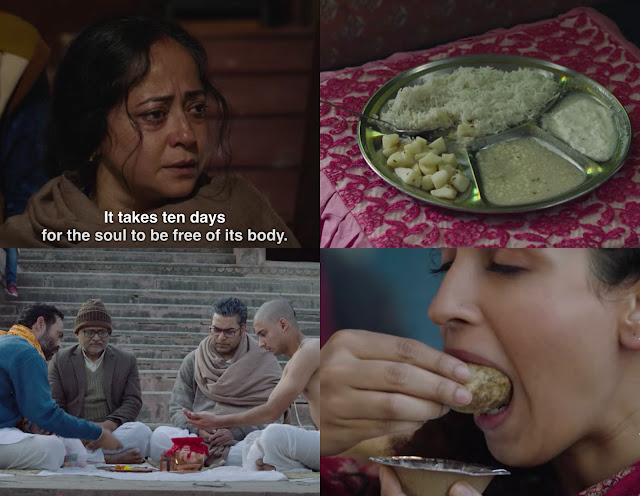
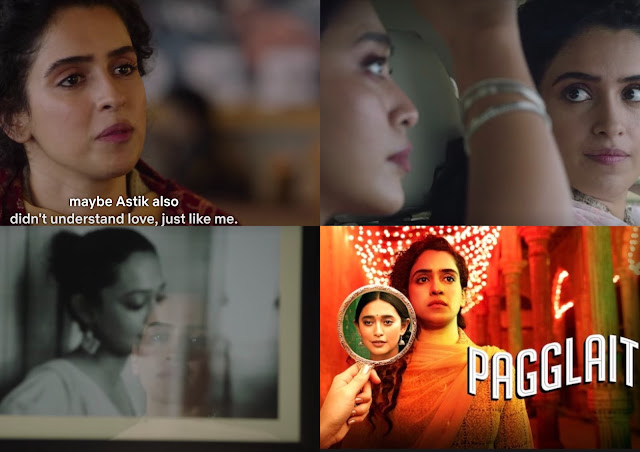
Sandeep Aur Pinky Faraar:
Dibakar Banerjee's Sandeep Aur Pinky Faraar surprised me with its takedown of toxic masculinity. In the film's final scene, Pinky (Arjun Kapoor) dances in a feminine way as a Chholiya dancer again dressed up in bright pink (like his name). There are no guns and no shootouts, but a man manages to escape with the help of femininity. The original dancer whose costume Pinky wears comments that he looks good without the mustache—another symbol associated with masculinity. The final confrontation happens on a bridge with all the men standing on the other side. The bridge starts to shake when the procession passes through; however, Pinky can get past the men crossing the border.

Sardar Udham:
Shoojit Sircar's technical masterpiece on Sardar Udham Singh was challenging to watch in the second half because of its harrowing reconstruction of the Jallianwala Bagh incident. But, when I think of this film, somehow, two scenes come to my mind. The first is the one in the early portions of the film where Udham Singh (Vicky Kaushal) walks alone amidst the snow in the USSR. The surrounding mounds of snow accentuate his loneliness to fulfill his dream of becoming a revolutionary for his country. The second is when Udham talks to the sympathetic Detective Inspector Swain (Stephen Hogan) in the final moments of the film. There is a glow of warm sunlight on his face. Udham tells his sympathetic friend about a teacher who once told him that youth is a gift and it is up to him to use it. After that night where he saw death, Udham spent all his life hoping to give it meaning. Udham was an orphan, but he found his family of humanity among the dead on that night. "Ek wahi bass apni thi, phir sab apne ho gaye."

Chandigarh Kare Aashiqui:
Abhishek Kapoor's Chandigarh Kare Aashiqui portrayed a love story between a transwoman Manvi (Vaani Kapoor), and a bodybuilder Manu (Ayushmann Khurrana). While the film did not go deep enough in its subject matter, its sensitivity and maturity in opening up the conversation about it are still noteworthy. The film depicted the coexistence of male and female characteristics in a person. For instance, both the characters have the same name Manu (Manvi was Manu before transition). Manu works out at a gym; Manvi takes Zumba classes in the same gym. The masculine gym energy exists with the feminine dance energy, like the Ardhnareshwara portrait that we see in the film. Manu is struggling to win the bodybuilding competition. Manvi gives him helpful advice to be more agile and learn Zumba. "Tight kapde, tight sapne. Thoda muscles ko bhi saans lene do." In the final competition, he won because he learned to be more flexible. Every Manu needs a bit of Manvi as well.


Ram Prasad Ki Tehrvi:
Seema Pahwa's debut film as a director about a family in mourning after the death of the patriarch was another little gem of the year. When I think about the film, two scenes come to my mind. The first one is where the kids talk about their grandmother (Supriya Pathak), repeating the same explanation when people ask her about the death of her husband. The film finds humor in death, and the portrayal of the family dynamics is so accurate. The second one is a slightly weird scene. There is a point in the film where the elder brother (Manoj Pahwa) is caught kissing his wife; I still remember this because I struggled to fully understand the implications of adding this scene.

Shershaah:
Vishnuvardhan's film on Kargil war hero Captain Vikram Batra avoided the hyper-nationalistic route that has become a staple in recent movies. I loved the entire song sequence of Ranjha where Vikram (Sidharth Malhotra) and Dimple (Kiara Advani) go to the gurdwara and take the four pheras. The song is one of the best songs of the year. The part where the singer says, "Kalli bheedh wich baithi, teri peedh le baithi, russeya Ranjha mera, main vi kam na aithi," is lovely.

Ajeeb Daastaans:
Everyone is making biopics. Everyone is now also making anthologies. Netflix made yet another one in Ajeeb Daastaans. Neeraj Ghaywan's Geeli Pucchi got all the acclaim. However, it was Kayoze Irani's Ankahee that I remember more. Natasha (Shefali Shah) meets Kabir (Manav Kaul), who is deaf and mute, at an art gallery. Natasha can speak in sign language as her daughter is also deaf. A bond develops between Natasha and Kabir that segues into romance. She asks him if he has ever said 'I love you' to anyone. He said he was scared to do so. After a night together, Kabir musters the courage to say these words to Natasha. He runs to her house but sees her with her husband and daughter. Natasha is taken aback to see him as she never told him about her family. She tells him that she does not need anything from him. He says that she managed to lie with her eyes. She shuts the door on him. His words remained unspoken...ankahee.

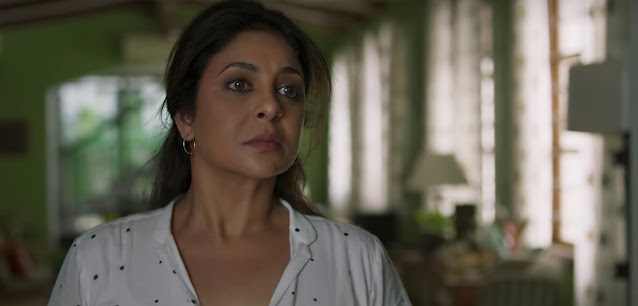
Atrangi Re:
Anand L. Rai's bizarre and blithe take on love was a polarizing film, but it was sublime in some parts. In the film, there is a scene where Sajjad (Akshay Kumar) hopes to perform a magic trick to make the Taj Mahal disappear. Vishu (Dhanush) and his friends go along with the charade to keep Rinku (Sara Ali Khan) happy. However, the trick fails. The Taj Mahal does not disappear. Rinku is disappointed and dejected. Her hero has failed. She starts crying as it reminds her of her father, who failed while performing a similar magic trick. The entire sequence happens in front of one of the most significant symbols of love—the type of love that Rinku believed in. I love the entire scene as it conveys the film's theme. Rai's last film Zero also had a scene where Bauua Singh (Shah Rukh Khan) could move the stars on his fingertips. At a party in Bombay, he tries to perform his trick of moving the stars in front of the ladies. He could not move them even one bit. The star Babita Kumari (Katrina Kaif) tells him that when you break someone's heart, even the stars won't listen to you. Bauua lost his essence because of how he behaved with Aafia (Anushka Sharma). The hero had failed there, too. But there is a path to redemption, even if flawed. Atrangi Re showed that path and that love can also heal. And, yes, not to forget the film's music was the best of the year. Tere Rang, Chaka Chak, and Little Little are simply beautiful.

I hope that a lot better Hindi films will be released in 2022 so that I can continue to write about them. Because if films are not interesting, I do not feel like writing. Here's also hoping that things get better for the industry and it can find a firm footing that it seems to be struggling of late.
Other Reading:
1. The post on Pagglait—Link
2. The post on Sandeep Aur Pinky Faraar—Link
3. The post on Sardar Udham—Link
4. The post on Geeli Pucchi from Ajeeb Daastaans—Link
5. The post on Atrangi Re—Link
Dialogue of the Day:
"Tight kapde, tight sapne. Thoda muscles ko bhi saans lene do."
—Manvi, Chandigarh kare Aashiqui















































